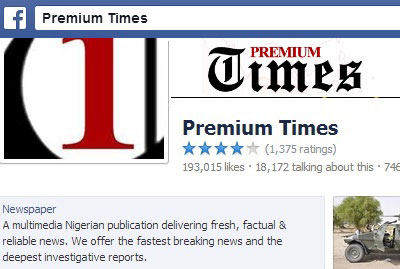Turkey’s prime minister made headlines last week by threatening to block Facebook in the country, but as recent events in Nigeria show, a more discreet intervention can be effective in disrupting the free flow of information.
The Internet, and Facebook in particular, is central to disseminating news in Nigeria, where traditional media are characterized by high operating costs, hampered by power cuts, or subject to external editorial interference from the government and advertisers. Nigeria has the highest number of Internet users in Africa, according to an Internet World Stats report from 2012, and Facebook is among the three most visited websites in the country, according to Web analytics company Alexa.
Critical news websites exposing corruption and reporting on human rights abuses and government regulation rely on Facebook to inform millions of readers in Nigeria and beyond about the workings (and failures) of the government and public officials.
But–as recently experienced by Premium Times, an Abuja-based award-winning investigative online newspaper–when you fight corruption, corruption fights back.
On January 3, 2014, the Premium Times website came under a denial-of-service (DOS) attack, with users across continents getting a “website blocked” message, Emmanuel Ogala, Premium Times‘ online editor, told CPJ. The website crashed on January 5 and took nine hours to restore, Premium Times reported.
Earlier, beginning November 5, 2013 and lasting two months, editors were blocked from posting Premium Times‘ links on the outlet’s Facebook page. Facebook users worldwide were also unable to post links from Premium Times on their own Facebook pages. At each attempt garnered a pop-up message: “The link you’re trying to go to has been reported as abusive by others on Facebook. For your safety, we’ve blocked it.” In the same message, Facebook requested, “If you think this link shouldn’t be blocked, please let us know.”
According to Facebook’s Reporting Guide, hundreds of its employees worldwide work 24 hours a day, seven days a week to review reports made to Facebook within 72 hours. An infographic explains that based on its Community Standards, Facebook’s Abusive Content Team ought to have contacted Premium Times about any alleged abusive link before blocking it, and provided measures for Premium Times to appeal the block.
Dapo Olorunyomi, Premium Times editor-in-chief, told me the newspaper’s management and several readers contacted Facebook to explain that the newspaper is a legitimate news organization holding governments, individuals, and corporations accountable while upholding the right of readers, especially Nigerians, to be informed. They did not receive any response, Olorunyomi said.
The effect of the blockade was chilling, Ogala told CPJ. Citing Google Analytics data, Ogala said Premium Times recorded a sharp decline in visitors to its Facebook page from 221,981 visitors in October to 70,588 visitors in November and 23,784 visitors in December, even as traffic to the website increased from 1.5 million visitors in October to 1.6 million visitors in November and 1.8 million visitors in December.
At the end of the year, Premium Times lawyer Jiti Ogunye wrote to Facebook Chief Executive Mark Zuckerberg asking why Facebook would not first investigate the claims of abuse and contact Premium Times before blocking the links.
Ogunye said those who reported Premium Times as abusive might be hired to do so by people unhappy with Premium Times‘ reporting. “All it takes for the social media platform to block a user or its website’s links is for a few aggrieved (even mischievous) users to repeatedly and concertedly file reports alleging abuse,” Ogunye said.
The paper’s potential enemies are numerous. Musikilu Mojeed, Premium Times managing editor, told me that government officials and their beneficiaries have tried to silence the newspaper since it began publishing in 2011. The newspaper’s allegations of corruption and electoral fraud have repeatedly embarrassed past and present government officials.
Nigerian authorities have publicly singled out Premium Times and New York-based Sahara Reporters for being unpatriotic. Information Minister Labaran Maku on live television on September 27, 2013, expressed his “utmost displeasure” at both online outlets over their critical reporting “deliberately contrived” to undermine military operations against terrorist activities in northern Nigeria.
Facebook finally restored Premium Times links on January 7, 2014.
“This could have happened by mistake or it is possible that someone at some point has hijacked the publication’s website to host bad links,” a Facebook spokesman told CPJ via email. “Either way, we’ve cleared the issue and people should once again be able to post links.”
The problem is not unique to Nigeria. According to a story last month in The Atlantic, media activists and opposition groups in Syria have seen their Facebook pages shut down, with the pro-Assad Syrian Electronic Army claiming responsibility for “reporting attacks.” The tactic is particularly devastating in a country where foreign and independent Syrian journalists are barred and public discussion is dangerous, the report said.
CPJ has long advocated for the operators of social media platforms to work with vulnerable journalists, media outlets, and civil society to ensure journalists can safely and freely gather and disseminate the news. Last year, we welcomed Facebook to the Global Network Initiative (GNI), a coalition of technology companies, civil society organizations, investors, and academics dedicated to safeguarding free expression and privacy online. CPJ is a founding member of the GNI.
Premium Times‘ disruption shows that although progress has been made, the dialogue regarding how best to protect journalists’ rights must continue.
